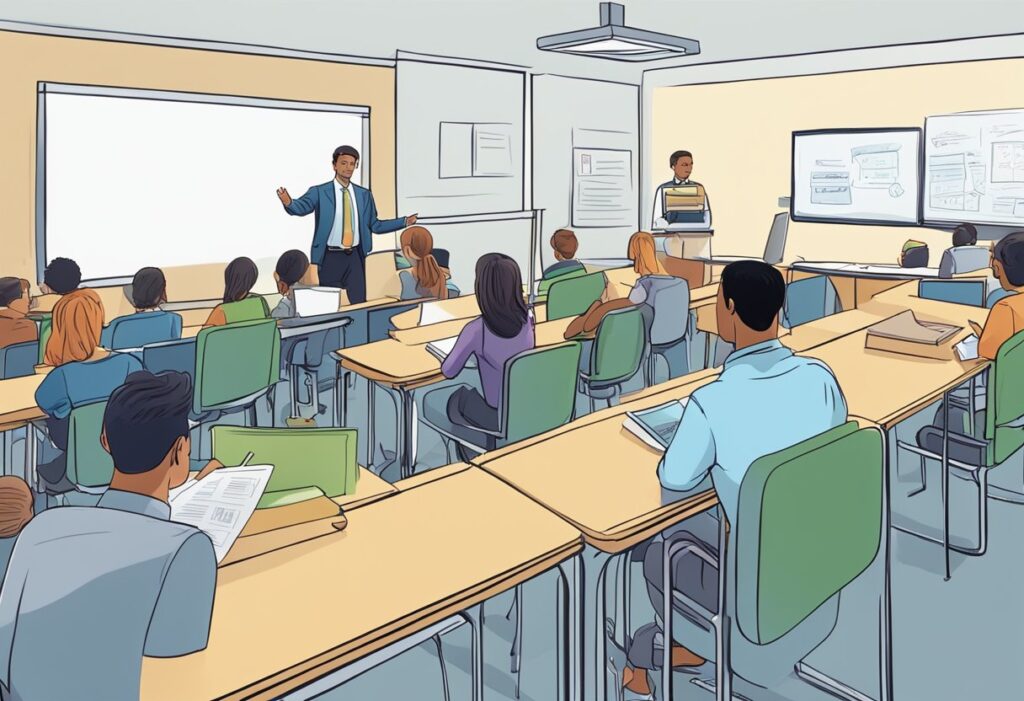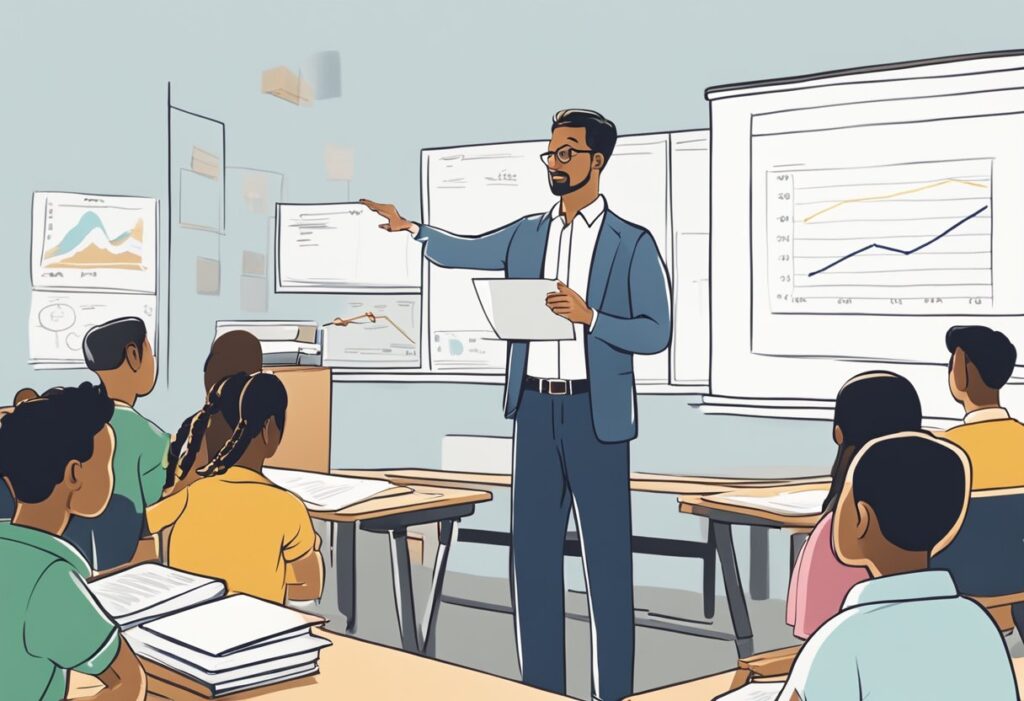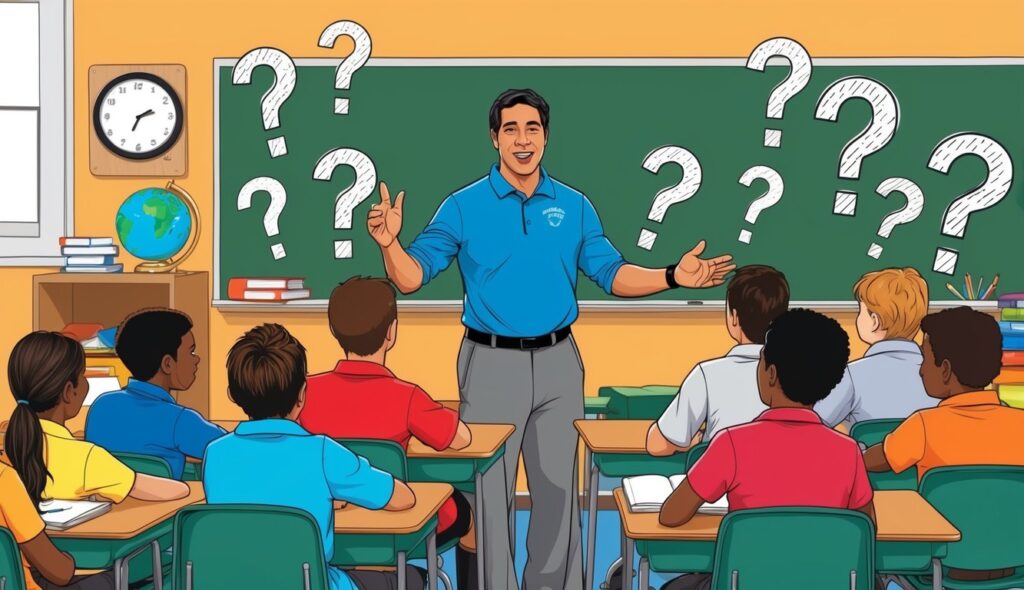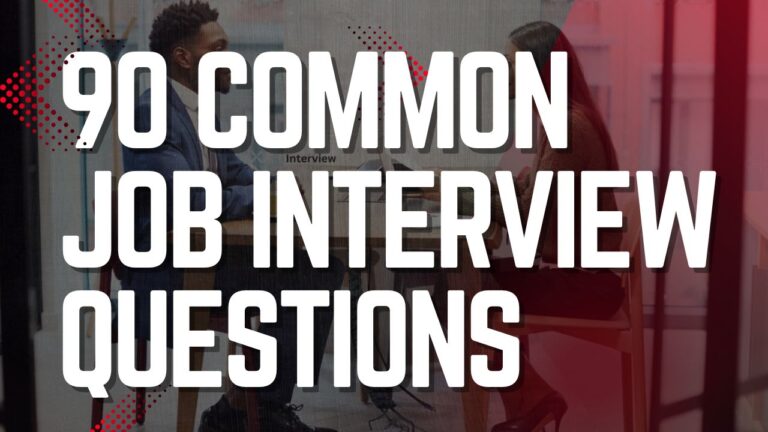100 Interview Questions Economics Teacher Job: Prepare for Success

Interviewing for a position as an economics teacher can be a significant step in your career. Schools are often keen to find teachers who are not only knowledgeable about economics but who can also engage students and foster a love for the subject. This post covers 100 Interview Questions Economics Teacher Job.
To stand out, you need to prepare well and understand the key questions that you might face during this process.

You may be asked about your teaching philosophy and how you can integrate real-world economic concepts into the classroom. Demonstrating how you plan to make economic theories accessible to students is crucial.
You could face questions that assess your ability to manage a classroom effectively and how you adapt your teaching methods to meet the diverse needs of students.
In addition to your teaching methods, interviewers might be interested in your experience with curriculum development and assessment. They may ask how you have used assessments to track student progress and improve their learning outcomes. Preparing for these questions can help you show that you are the right fit for the job.
- Understanding the Role of Economics Teacher
- List of 100 Interview Questions Economics Teacher Job
- Teaching Methods & Assessment
- Classroom Challenges
- Content Knowledge & Curriculum Development
- Technology & Innovation
- Professional Development
- Real-World Application
- Student Support & Collaboration
- Reflective Questions
- Personal Traits & Skills
- School-Specific Situations
- Future-Oriented
- Final Questions
- Essential Skills and Qualities (Economics Teacher Job Interview)
- Frequently Asked Questions: Economics Teacher Job Interview
Understanding the Role of Economics Teacher

As an economics teacher, you help students grasp key economic concepts and meet educational standards. You create lesson plans and manage the classroom to support effective learning.
Role of an Economics Teacher
In teaching economics, your main goal is to make complex ideas understandable. You need to plan lessons that cover topics like supply and demand. Break down difficult concepts into simpler parts so students can easily grasp them.
Creating lesson plans is essential. These plans should align with educational standards. They guide what you’ll teach, ensuring students meet necessary goals. Planning involves choosing the right materials and activities to engage students.
Classroom management is also crucial. You must maintain a supportive learning environment. This helps students focus, encouraging participation and mutual respect. Managing behavior and fostering a positive atmosphere are key to successful teaching.
List of 100 Interview Questions Economics Teacher Job

1. Tell us about yourself.
Sample Answer:
“I am a dedicated and passionate economics educator with over [X years] of teaching experience in both middle school and high school settings. I hold a degree in Economics and a teaching certification in [your state or country]. My approach to teaching combines theory with real-world applications, fostering critical thinking among students. I enjoy designing interactive lesson plans and using technology to make learning engaging.”
2. Why do you want to become an economics teacher?
Sample Answer:
“I’ve always had a passion for economics because it explains how decisions impact daily life. I became a teacher to share that passion with students and help them understand how economic concepts affect the world around them. Teaching allows me to inspire curiosity and equip students with skills that will benefit them throughout their lives.”
3. What teaching strategies would you use to make economics engaging for students?
Sample Answer:
“I would use a mix of real-world case studies, interactive activities, and technology to make economics more relatable. For example, I could use simulations, such as stock market games or supply-and-demand role-plays, and incorporate current events into lessons to connect abstract concepts to students’ daily lives.”
4. How do you handle difficult or unmotivated students?
Sample Answer:
“I believe building strong relationships with students is key to motivating them. I try to learn about their interests and adapt lessons to make the material more relevant to their lives. I also maintain patience and create a supportive classroom environment where students feel comfortable asking questions or expressing challenges.”
5. What is your classroom management style?
Sample Answer:
“My classroom management style is proactive and positive. I establish clear expectations and rules at the beginning of the school year and focus on consistency and fairness. I encourage students to respect each other and contribute positively by using positive reinforcement rather than solely focusing on punishment.”
6. How do you assess student understanding and progress in economics?
Sample Answer:
“I use a variety of assessment methods, including formative assessments like quizzes, projects, and interactive discussions. I also use summative assessments such as standardized tests, essays, or projects to gauge overall understanding. I regularly analyze the results to adjust instruction and provide additional support as necessary.”
7. How do you incorporate technology into your teaching?
Sample Answer:
“I use technology to make economics lessons more interactive and accessible. Tools like interactive whiteboards, economic simulation software, and online collaboration tools such as Google Classroom enable students to analyze data, participate in virtual role-plays, or solve real-world case studies, making the concepts more tangible.”
8. How do you stay current with the latest developments in economics and education?
Sample Answer:
“I subscribe to economics journals, attend educational conferences, and participate in professional development workshops. I also connect with other educators through professional learning communities and stay updated on trends in both economics and teaching methodologies.”
9. How do you integrate real-life economics concepts into your curriculum?
Sample Answer:
“I integrate real-life concepts by using case studies, current events, and practical examples. For instance, we could study the effects of inflation by examining recent price changes or explore supply and demand by analyzing current trends in industries like technology or retail.”
10. How do you teach complex economic theories to younger or struggling students?
Sample Answer:
“I break down complex concepts into manageable parts and relate them to real-life situations. I use visual aids, examples, and analogies to make the material simpler and ensure students can connect new information with what they already know.”
11. What is your philosophy of teaching economics?
Sample Answer:
“My philosophy is that economics should be accessible and relevant to all students. I believe every student should leave my class with both a foundational understanding of economic concepts and the critical thinking skills to analyze financial decisions and market trends.”
12. How would you handle a situation in which a parent challenges your teaching methods?
Sample Answer:
“I would approach the parent with empathy and professionalism. I would listen to their concerns and explain my teaching methods, focusing on how they are designed to support student learning and engagement. I believe communication is key, and I would work with the parent to address any issues collaboratively.”
13. What are the key economic concepts you emphasize in your teaching?
Sample Answer:
“I emphasize foundational concepts such as supply and demand, opportunity cost, market structures, fiscal policy, monetary policy, economic growth, inflation, and the role of scarcity in decision-making. These concepts are critical for students to understand how economics shapes their choices and world events.”
14. How would you approach teaching economics to students with varying skill levels?
Sample Answer:
“I differentiate instruction by tailoring activities, assignments, and lessons to meet students’ individual learning needs. For advanced learners, I provide opportunities for deeper exploration and analysis. For struggling students, I use scaffolding techniques, targeted interventions, and hands-on activities to build understanding and confidence.”
15. What strategies do you use to ensure that students actively participate in your class?
Sample Answer:
“I use strategies like interactive group discussions, peer-to-peer learning, problem-solving tasks, and inquiry-based learning. I incorporate technology, games, and real-world examples to make lessons engaging and relevant, which motivates students to contribute actively.”
16. Can you provide an example of a successful lesson plan you implemented?
Sample Answer:
“One successful lesson focused on the concept of supply and demand. I used a hands-on activity where students participated in a mock marketplace, taking on the roles of buyers and sellers. They had to respond to changes in market conditions by adjusting prices or demand.
17. How would you handle students who are disruptive during class discussions?
Sample Answer:
“I would first address disruptive behavior privately, if appropriate, by speaking to the student after class or during a break. I would remind them of the expectations for mutual respect and participation. I also use proactive strategies like setting clear ground rules and fostering a positive, supportive classroom culture.”
18. How do you ensure that your students are ready for standardized tests and assessments?
Sample Answer:
“I prepare students by incorporating practice tests, review sessions, and test-taking strategies into the curriculum. I focus on helping students understand economic principles rather than just memorization. Additionally, I provide feedback on their practice exams so they can identify areas for improvement.”
19. What are your thoughts on the use of current events in teaching economics?
Sample Answer:
“I believe that integrating current events into economics lessons makes learning more relevant and exciting for students. It allows students to connect theoretical concepts to real-world scenarios, such as analyzing the economic impact of recent policy decisions, market shifts, or global trade developments.”
20. How do you create a positive classroom environment for students?
Sample Answer:
“I create a positive classroom environment by building trust with students, setting clear expectations, and maintaining open communication. I foster respect and inclusion by encouraging group work and ensuring every student feels their voice is valued. I also celebrate student successes to build confidence.”
Teaching Methods & Assessment
- How do you assess student understanding and progress in economics?
- What strategies do you use to ensure that students are ready for standardized tests and assessments?
- How do you use formative assessments to gauge student progress?
- How do you prepare students for end-of-term exams?
- How would you teach complex economic theories to younger or struggling students?
- Can you provide an example of a successful lesson plan you implemented?
- What teaching materials or resources do you typically use?
- How would you use technology in economics lessons?
- What strategies do you employ to adapt lessons based on student feedback?
- How do you balance covering the curriculum and addressing individual learning needs?
Classroom Challenges
- How do you handle difficult or unmotivated students?
- How do you address disruptive behavior during class discussions?
- How would you manage a student who consistently struggles with content?
- How would you respond if a parent challenged your teaching methods?
- What would you do if a student was consistently late to class?
- How do you handle situations in which students refuse to participate?
- How would you handle a situation in which students do not respect classroom rules?
- How would you support students during stressful times, such as during exams?
- How do you create opportunities for struggling students to catch up on missed work?
- How do you ensure students maintain respect during group activities?
Content Knowledge & Curriculum Development
- What are the key economic concepts you emphasize in your teaching?
- How do you ensure that students understand supply and demand?
- How would you explain opportunity cost to younger students?
- How do you make abstract economic theories accessible to all learners?
- How do you address challenges in teaching macroeconomic concepts?
- How do you approach teaching monetary and fiscal policy?
- How would you incorporate real-world case studies into your curriculum?
- How do you introduce the concept of market structures to students?
- How would you approach teaching about globalization and trade?
- How do you teach about the role of scarcity in decision-making?
Technology & Innovation
- What role do you think technology plays in the economics classroom?
- Which online platforms or tools would you integrate into economics lessons?
- How would you use online simulations to support teaching economics?
- How do you feel about using games or competition in economics education?
- How would you use multimedia like videos or podcasts in your curriculum?
- Have you ever used data visualization tools for teaching economics? If so, how?
- What are your thoughts on implementing flipped classrooms in economics?
- How would you integrate current events into teaching with technology?
- What is your experience with using Google Classroom or other virtual learning platforms?
- How do you incorporate technology to prepare students for economic data analysis?
Professional Development
- How do you stay updated with the latest developments in economics and education?
- What professional development opportunities have you participated in recently?
- How do you use peer learning or professional collaboration to improve your teaching?
- How would you implement new teaching strategies learned through professional development?
- What are the most impactful trends in economics education that excite you?
- How would you evaluate your own professional growth as an economics teacher?
Real-World Application
- How would you connect economic theory with real-life financial decisions for students?
- How would you teach students to analyze the effects of inflation on consumers?
- How would you show students how supply chain disruptions affect economies?
- How would you design a project based on economic decision-making?
- How would you incorporate local and global economic events into teaching?
- What practical tools would you teach students to use when analyzing market trends?
Student Support & Collaboration
- How would you handle students who need additional support outside of the classroom?
- How do you partner with parents or guardians to support students’ academic progress?
- How do you approach collaboration with other teachers to plan interdisciplinary lessons?
- How would you help students set and achieve academic goals in economics?
- How do you use student feedback to improve your lessons?
- How would you establish rapport with your students on the first day of class?
Reflective Questions
- How do you reflect on your own teaching methods?
- What would you do if you realized a lesson was ineffective?
- How do you adapt your teaching strategies to ensure all students succeed?
- How would you handle a situation where you were unprepared for a lesson?
Personal Traits & Skills
- How would you describe your teaching style?
- How do you prioritize your time and responsibilities?
- How would your students describe you?
- How do you handle stress or tight deadlines?
- How would you balance passion and professionalism in teaching?
School-Specific Situations
- How do you handle cultural diversity in your classroom?
- How would you foster inclusive discussions about sensitive economic topics?
- How do you ensure all students feel included in classroom discussions?
Future-Oriented
- How would you design your curriculum to prepare students for modern economic challenges?
- How do you set long-term goals for your students in economics?
- How would you introduce innovation and creativity into your teaching?
Final Questions
- How do you ensure that students are developing critical thinking skills?
- How would you support students’ development of financial literacy?
- What would you do on your first day of teaching a new class?
- How would you engage students during a discussion about economic trends?
- What teaching strategies would you use for students preparing for advanced courses in economics?
- How do you assess your own progress as a teacher?
- What is your ultimate goal as an economics teacher?
Essential Skills and Qualities (Economics Teacher Job Interview)

In becoming an effective economics teacher, it is crucial to possess and hone specific skills and qualities. These include strong communication and collaboration abilities, excellent analytical and critical thinking skills, adaptability with a willingness for continuous learning, and the ability to design engaging curriculums.
Communication and Collaboration
As an economics teacher, you’ll need to convey complex ideas clearly. Communication involves speaking, listening, and writing in ways that ensure students understand challenging concepts.
Collaboration is also the key. Working with other educators and staff is important to build a supportive learning environment. Sharing ideas and resources enriches students’ experiences and your teaching practice. It’s critical to foster a positive, interactive atmosphere that encourages students to ask questions and engage in the discussions.
Analytical and Critical Thinking Skills
Teaching economics demands strong analytical skills. You’ll need to break down data and communicate findings simply. This involves using data to illustrate economic concepts and trends effectively.
Critical thinking helps you guide students in analyzing information. Encouraging them to question assumptions and solve problems in creative ways sharpens their thinking. Developing these skills ensures your students understand complex economic issues and are prepared for real-world scenarios.
Adaptability and Continuous Learning
In a rapidly changing world, adaptability is vital. You should be flexible in your teaching methods, adjusting to new information and technologies. This means being open to new teaching strategies that may better serve your students’ varied needs.
Continuous learning highlights your commitment to professional growth. Keep updated with the latest economic theories and educational practices. Attending workshops and engaging in webinars improves your instructional approaches, making you an even more effective teacher.
Designing Engaging Curriculum
Creating engaging curricula that are relevant and interesting is crucial. Your curriculum should connect students to real-world economics.
Incorporating diverse teaching materials ensures you reach all learning styles. Designing courses that capture students’ interests boosts their problem-solving and critical thinking skills in economics.
Frequently Asked Questions: Economics Teacher Job Interview

As an economics teacher, you will need strategies to keep students interested, assess their understanding, and encourage critical thinking. These FAQs will guide you in creating an engaging and inclusive learning environment.
Can you explain how you would make the subject of economics engaging for students?
Use real-world examples to show how economics affects daily life. Incorporate interactive activities like debates and simulations to spark interest.
Connecting economic theories to students’ lives can make lessons more relatable and engaging for them.
What methods do you employ to assess student understanding of economic concepts?
Utilize a mix of quizzes, projects, and class discussions to gauge understanding. Regular feedback helps identify areas where students might be struggling.
You might also use peer assessments to promote collaborative learning and self-reflection.
Could you provide an example of a lesson plan that incorporates both micro and macroeconomic principles?
Design lessons that explore supply and demand within local markets and how these affect broader economic policies. Combining case studies with simulations can help students understand the relationship between micro and macroeconomics.
This approach offers a comprehensive view of how different economic levels interact.
How do you differentiate your teaching to support students with varying levels of economic proficiency?
Adapt your lessons with diverse materials like videos, articles, and hands-on activities. Using small groups allows you to tailor instruction to different skill levels.
It’s important to provide additional support or challenges based on each student’s needs to ensure everyone can succeed.
What strategies do you use to encourage critical thinking about economic issues in the classroom?
Pose open-ended questions that require analysis and debate. Encourage students to explore different viewpoints on economic topics.
Activities like role-playing and group discussions can stimulate critical thinking and allow students to engage deeply with economic issues.
All the Best !






